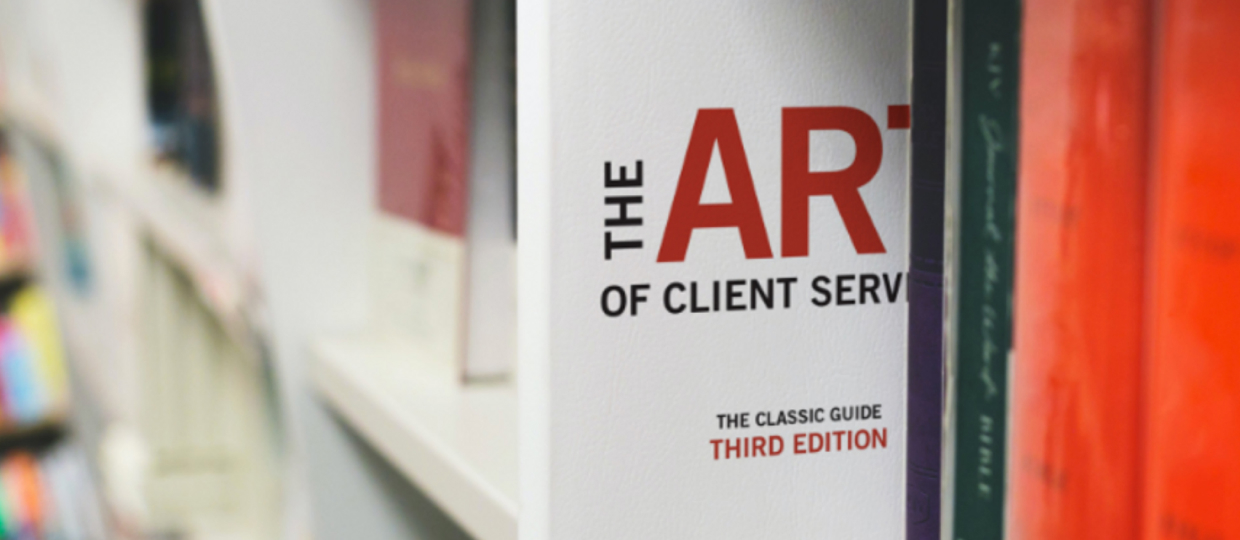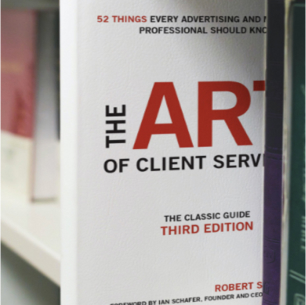The art of client service


When I entered the agency world straight out of a liberal arts college, I didn’t know much (or anything really) about Account Management. Very quickly — thanks to some amazing mentors and coaches — I learned and practiced, and the work came naturally. I’ve made a career out of serving clients, and I love it. But it’s often hard to explain what I do and why it matters.
Recently during a book club with my colleagues at Notion I was reminded that Account professionals are often the unsung heroes behind successful creative work. The Art of Client Service by Robert Solomon is a book that celebrates and coaches Account professionals, and supports the value we bring to the business environment.
This is a must-read for any aspiring agency Account Manager. It offers stories and relevant examples that get to the heart of what we do, and how we can be better at serving clients. It provides actionable reminders and insights to help us better understand, navigate and appreciate our roles. And the next time someone asks you, “what exactly do you do?” — you’ll have an excellent resource to share.
Here are some of my favorite takeaways:
#1 “Relationships built on trust will lead to the best possible work. And that is what drives and inspires all of us every day.” (p. 11)
Early in my career, I followed the principle “good work begets good work” and spent too much time focusing on the quality of the end deliverable. I worried about the details, processes and accuracy. I was a perfectionist and wanted things to be right. But sometimes this behavior got in the way.
I soon learned that none of it matters without trust and a strong relationship — between the agency and the client, the agency and individual and among individual team members. If you have a good relationship, you can have honest conversations and empathy for each other. It’s easier to collaborate, take risks, forgive mistakes and grow together. That is how I came to understand that the principle should read “great relationships beget great work.”
#2 “You need to be multilingual if you are going to provide your client good counsel. You don’t need to be fluent in every marketing language. There are native speakers in every discipline and medium you can call on for help. The key is to be thinking about the best combination of disciplines.” (p. 58)
This touches my heart, because I believe the range of perspectives and life skills (and neurotransmitters) I gained from being bi-cultural and multilingual have aided in my ability to serve clients. Juggling multiple business objectives and client needs — and ensuring that you are providing the best solution — is truly an art. It helps to be open and adaptable. A broad knowledge level is essential. And you have to be okay with not knowing things and learning how to be resourceful, because every business challenge is unique. Your job is to find the best solution while the industry is constantly changing.
#3 “Great account people do not sell. Instead, they serve as partners to both their colleagues and to their clients, with a responsibility to facilitate the creation of great work, and a goal of helping clients make the right decisions about the work.” (p. 162)
If Account professionals are expected to sell, I would have been out of the industry my first year because selling does not come naturally to me. Rather, I’m driven by a desire to help and solve problems. The joy comes from sharing our expertise and working together — building a partnership, not an “us vs. them” mentality.
Our strength lies in understanding and organizing working relationships so that everyone involved knows what’s going on and who’s doing what. People lean on us to support them so that they can be the best creators, producers and marketers. We listen, strategize, collaborate, challenge opinions, stretch skills and win together.
#4 “It takes emotional commitment to make creative work. It takes emotional detachment to make it better.” (p. 166)
When you care and work hard, it’s natural to value the time and energy spent and feel accomplished. But sometimes — especially if you don’t love what you see — you have to step back and ask, “so what?” “does it work?” and “is this the best we can do?”
As Account professionals, we do so much more than approve and check the box — and we don’t have to love the deliverable either. Our clients and team depend on us to objectively assess the work from multiple angles, provide guidance and share feedback to improve the work. It can be hard to critique and potentially hurt feelings, but that feedback helps us all grow. We should all care about the work, but we can’t take it personally. Productive criticism demands critical thinking and thoughtful communication — all in the spirit of making the work better.
#5 “Account people are writers of presentations, a proposal, a point-of-view positioning, a conference report, emails of every stripe and virtually anything that is committed to paper, real or digital.” (p.237)
This is where I should thank all my professors for assigning countless art history papers and chemistry lab reports, and maybe even my parents for all the “Thank You” letters we sent to relatives. The skills I learned writing concise essays about Impressionist paintings or explaining scientific methodology and results have contributed to my ability to write in the business space.
We spend most of our time communicating by drafting emails, briefs, proposals, etc., speaking up or presenting. We must be comfortable doing it all, and confidence grows with experience. And while we don’t hold the title of Copywriter, some Account people truly enjoy writing and may be able to straddle roles and provided added value to their agencies.
#6 We should always be learning
Finally, the last section of Solomon’s book provides a list of “a bunch of books to make you better at what you do.” (p. 250). It’s a gift for professional learning junkies like me because I believe that life-long learning is what it takes to be effective in the art of client service.

